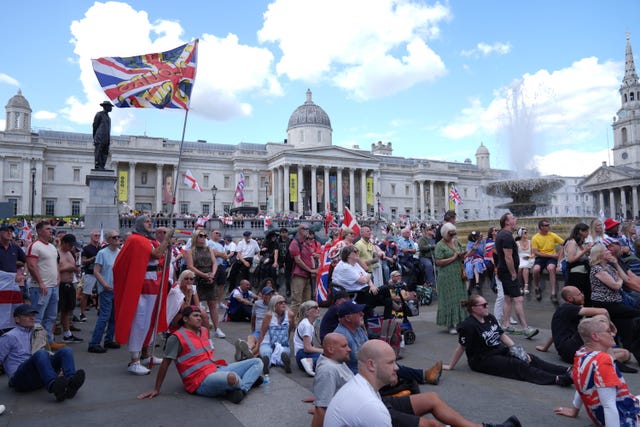Tommy Robinson leaves UK amid contempt of court case, High Court told
The Solicitor General launched legal action against Robinson in June over an alleged breach of a court order after he lost a libel battle in 2021.

Tommy Robinson has left the country after committing “flagrant” contempt of court relating to a film played at a protest in central London, the High Court has been told.
Robinson, whose real name is Stephen Yaxley-Lennon, was due to appear at the Royal Courts of Justice on Monday for a hearing in his latest contempt of court case but was not in attendance.
The Solicitor General launched legal action against Robinson in June over alleged breaches of a court order after he lost a libel battle in 2021.
But Adam Payter, representing the Solicitor General, said it is believed Robinson, 41, left the jurisdiction hours after being released on unconditional bail following his arrest in Kent over the weekend.
Mr Justice Johnson issued a warrant for Robinson’s arrest after he did not attend the hearing, but ordered that it not be carried out “until early October” to allow Robinson time to indicate that he would attend the next hearing voluntarily or to apply to “set aside” the warrant.
Mr Payter said Robinson had been part of a “large demonstration” in central London on Saturday, which featured the showing of a film that was “central to this application” and showed a “flagrant” and “admitted” breach of the court order.
The court heard that Saturday’s incident is not currently the subject of contempt of court proceedings, with police saying officers are making further inquiries.
Kent Police did not name the political campaigner but confirmed a 41-year-old man had been arrested on Sunday for the “frustration” of a port stop at the Channel Tunnel at Folkestone under Schedule 7 of the Terrorism Act 2000.
Under Schedule 7, police are allowed to stop anyone passing through a UK port “to determine whether they may be involved or concerned in the commission, preparation or instigation of acts of terrorism”.
The person who is detained can be held for up to six hours, is legally obliged to answer questions, and must provide the password or PIN for electronic devices, or be held to have committed a criminal offence if they refuse.
In an audio clip posted on Robinson’s X account, formerly Twitter, he is heard telling his ex-wife that officers have demanded the PIN code for his phone.
Robinson says he objected to the request because there would be legally privileged information on his phone, relating to an ongoing High Court case, and interviews that he has carried out relating to a documentary he is making.
At the hearing on Monday, Mr Payter said: “We understand he failed to co-operate with a port stop and search. The implication is he was attempting to leave the country and therefore was not intending to attend this hearing this morning.”
He added that Robinson was reminded of Monday’s hearing before being released on unconditional bail at 10pm on Sunday, but that it is now believed he “left the UK last night and there was nothing to prevent him from doing so”.
Under the court order imposed in 2021, Robinson was barred from repeating allegations he made against a Syrian refugee, Jamal Hijazi, who sued him for libel.
The Solicitor General claimed in written submissions that Robinson “knowingly” breached the order by having “published, caused, authorised or procured” a film titled “Silenced” in May last year.
It is claimed he then repeated the allegations banned by the injunction in three interviews between February and June 2023.
Mr Payter said that, at the demonstration on Saturday, the film was shown again, with a new introduction showing Robinson addressing a camera outside the Royal Courts of Justice.

He added that Robinson “is not within the jurisdiction of the UK” and had returned to the UK “with the purpose of publishing the film” before leaving the country again “to put himself beyond the reach of this court’s jurisdiction”.
Mr Justice Johnson said he was “entirely satisfied” that the hearing could proceed in Robinson’s absence, telling the court that a further hearing in the case is expected to be held in October.
Mr Hijazi successfully sued Robinson after the then-schoolboy was assaulted at Almondbury Community School in Huddersfield, West Yorkshire, in October 2018.
After a clip of the incident went viral, Robinson made false claims, including about Mr Hijazi attacking girls in his school, leading to the libel case.
Mr Justice Nicklin ordered Robinson to pay Mr Hijazi £100,000 in damages and his legal costs, as well as making the injunction preventing Robinson from repeating the allegations he made against the then-teenager.
Campaign group Hope Not Hate alleged that Robinson had ignored the injunction and repeated the allegations, providing a “dossier of evidence” to the Attorney General’s Office, with the Solicitor General then taking legal action.





